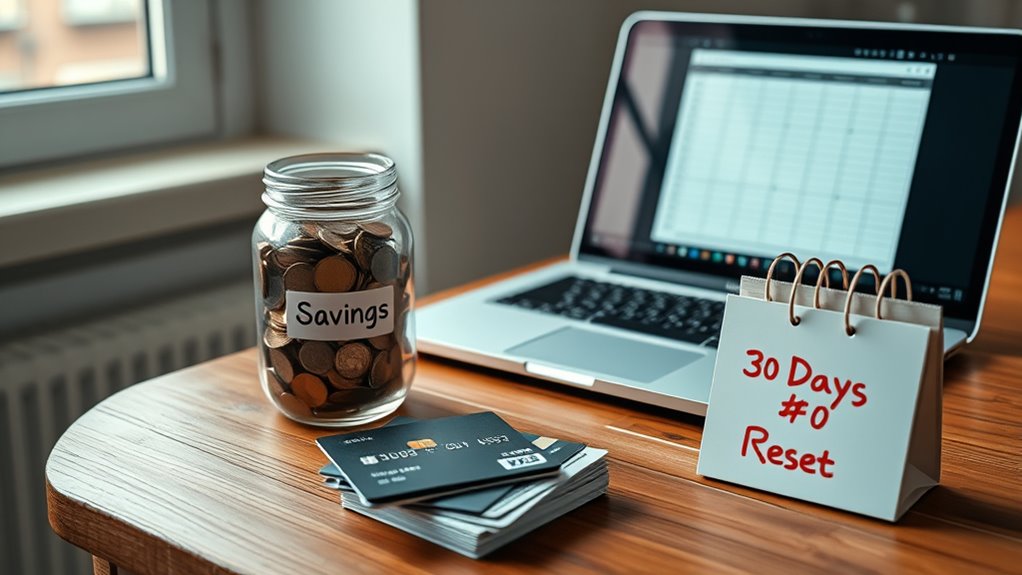A 30-day financial fasting helps you reset your mindset around money, develop mindful spending habits, and set clear financial goals. During this period, you track every dollar, spot unnecessary expenses, and build sustainable savings. It encourages you to review recurring costs and prioritize long-term financial health. By committing to this reset, you’ll gain greater control over your finances and establish habits that last. Keep exploring to discover practical steps to start your own financial fasting journey.
Key Takeaways
- A 30-day financial fast resets your mindset and fosters better spending habits by promoting mindful tracking and intentional purchases.
- It helps identify unnecessary expenses and recurring costs, enabling sustainable savings and cost-cutting measures.
- Practicing budget mindfulness during this period increases awareness of spending leaks and supports proactive financial decision-making.
- Setting specific financial goals during the fast boosts motivation and provides clarity on priorities like debt repayment and savings.
- The reset encourages long-term discipline, leading to improved financial health and a stronger foundation for future financial stability.

Have you ever considered how a temporary break from spending can reset your financial health? Taking a 30-day pause on unnecessary expenses isn’t just about saving money; it’s a chance to reset your mindset around money, develop better habits, and gain clarity about your financial priorities.
During this period, practicing budget mindfulness becomes essential. Instead of mindlessly swiping your card or impulsively buying things, you actively focus on tracking every dollar that leaves your wallet. This heightened awareness helps you identify patterns—like where your money leaks or what expenses are truly necessary—and encourages you to make more intentional choices. Budget mindfulness isn’t about restriction; it’s about understanding your habits and making smarter decisions that align with your long-term goals.
Practice mindful spending by tracking every dollar to identify habits and make intentional, goal-aligned choices.
As you enter this fasting phase, it’s a perfect time to refine your savings strategies. Instead of just aiming to cut costs temporarily, think of this period as an opportunity to build sustainable habits. For example, you might set aside a specific amount each week for emergency savings or future investments, reinforcing the importance of paying yourself first.
This approach not only helps you accumulate funds but also shifts your mindset from reactive spending to proactive saving. You’ll begin to see your financial picture more clearly, which can motivate you to stick with these habits beyond the 30 days.
During your financial fast, you may find it helpful to review recurring expenses and identify areas where you can cut back permanently. Cancel unused subscriptions, reduce dining out, or limit online shopping. These small adjustments can have a significant impact on your overall financial health, especially when they become habitual.
Furthermore, this period offers a chance to set specific, achievable goals—whether it’s saving a certain amount, paying down debt, or simply gaining control over your spending. Having clear objectives keeps you motivated and focused.
Research shows that understanding your financial habits can lead to more effective money management and better long-term outcomes.
Frequently Asked Questions
How Do I Prepare Mentally for a Financial Fast?
To prepare mentally for a financial fast, start with mindset shifts that focus on discipline and self-awareness.
Set clear goals to stay motivated and remind yourself of your reasons for fasting.
Visualize success and embrace the challenge as an opportunity for growth.
Keep positive affirmations handy, and plan how you’ll handle urges to spend.
This mental preparation helps build resilience and keeps you committed throughout the process.
What Are Common Challenges Faced During Financial Fasting?
During a financial fast, you might face challenges like mindset shifts and emotional triggers, making it hard to resist impulsive spending. You may feel deprived or anxious, which tests your resolve.
Recognizing these emotional triggers helps you stay focused. Expect moments of temptation, but remember that developing discipline and understanding your triggers will strengthen your financial habits long-term.
Staying mindful and committed keeps you on track.
Can Financial Fasting Improve Long-Term Financial Health?
Financial fasting can definitely improve your long-term financial health. By practicing spending mindfulness during this reset, you learn to identify unnecessary expenses and develop disciplined savings strategies.
This heightened awareness helps you make smarter choices, build better habits, and establish a solid financial foundation. Over time, these changes lead to increased savings, reduced stress, and a more secure financial future, making financial fasting a powerful tool for lasting financial well-being.
How Should I Handle Emergencies During the Fast?
During your fast, you should prioritize your emergency fund for unexpected expenses. Keep a small stash accessible for urgent needs, so you don’t derail your fast or risk financial hardship.
If an emergency arises, resist the temptation to dip into regular spending, and instead, use your designated emergency fund. This way, you protect your progress while handling unexpected expenses responsibly.
Is Financial Fasting Suitable for All Income Levels?
Imagine someone with a high income still struggling with overspending. Financial fasting can suit all income levels because it helps identify spending patterns and promotes mindful budgeting.
Income diversity doesn’t determine your ability to benefit; instead, it’s about your willingness to reset habits. Whether you earn more or less, you can adapt the fast to fit your financial situation, making it a versatile tool for everyone.
Conclusion
By embracing financial fasting, you’ll forge a fresh financial footing, free from frivolous flaws. This mindful maneuver molds money management, minimizes mindless spending, and motivates meaningful money habits. With discipline, dedication, and determination, you’ll develop a disciplined, debt-free demeanor. Remember, the journey to financial freedom begins with small steps. So, seize the savings, strengthen your self-control, and step into a secure, sustainable spending style—your future self will thank you for the mindful money makeover.










